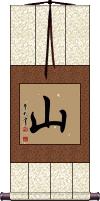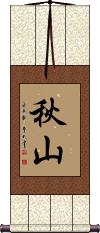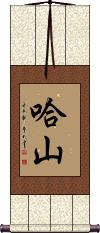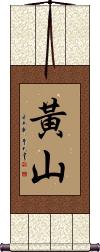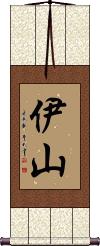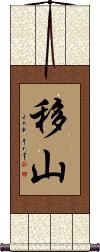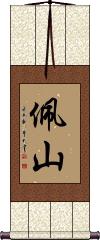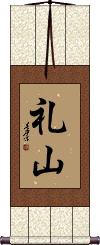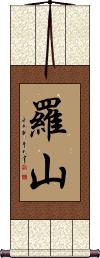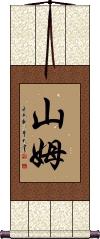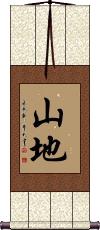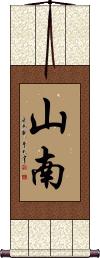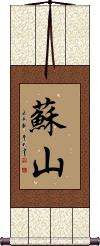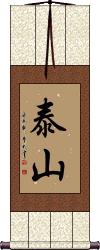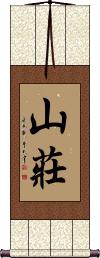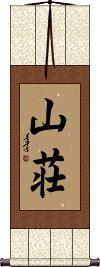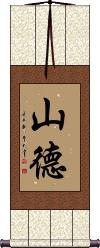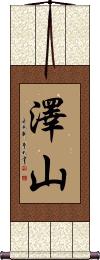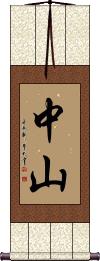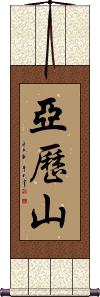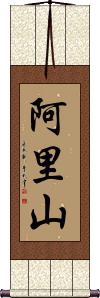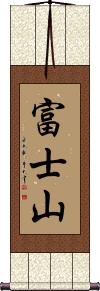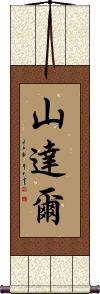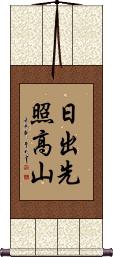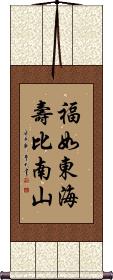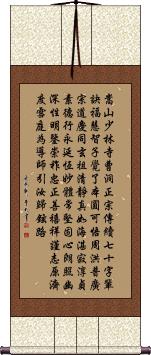Many custom options...
And formats...

山 in Chinese / Japanese...
Buy an 山 calligraphy wall scroll here!
Personalize your custom “山” project by clicking the button next to your favorite “山” title below...
1. Mountain
2. Akiyama
3. Hashan
4. Huang Shan / Yellow Mountain
5. Ishan
6. Nothing is Impossible with Persistence
7. Nishan
8. Peishan
9. Reizan
10. Roshaan
11. Sam
12. Sanchi / Yamaji
13. Shannan
14. Sushan
15. Tarzan
16. Mountain Villa
17. Xander
18. Yamada
19. Zeeshan
20. Zhongshan
21. Alexan
22. Alisan
23. Mt. Fuji
24. Rosanda
25. Scarecrow
26. Toyama-Ryu
27. Xandar
28. Capricorn
29. Akashanshu
30. Aleksandar
31. Aleksander
32. Aleksandr
33. Aleksandre
34. Alexand
35. Alexandar
36. Alexander
37. Alexandr
38. Alexandre
39. Bounce Back / Stage a Comeback
40. Furinkazan
42. Longevity / Long Life Wishes
43. Melissandre
44. Where There is a Will, There is a Way
45. Aleksandra
46. Alekzandra
47. Alessandra
48. Alessandro
49. Alexandera
50. Alexandra
51. Alexandrine
52. Alexandro
54. Dalessandro
55. When the sun rises it first shines on the highest mountain
57. Longevity / Long Life Wishes
Mountain
Akiyama
Hashan
Huang Shan / Yellow Mountain
Ishan
Nothing is Impossible with Persistence
移山 is the Chinese, Japanese Kanji, and old Korean Hanja for “to remove mountains” or “to move a mountain.”
Figuratively, this means you can accomplish the impossible by sheer persistence.
移山 is the short form of a proverb about a man who had much persistence and could move a whole mountain (a bucket of soil at a time).
Nishan
Peishan
Reizan
Roshaan
Sanchi / Yamaji
山地 means mountainous region, hilly area, or hilly country in Chinese, Japanese, and Korean.
山地 is also a Japanese surname that romanizes as Yamaji or Sanchi.
Note: This is not the only Japanese name that romanizes as Yamaji or Sanchi. Make sure this is the right one before you order.
Shannan
Sushan
Tarzan
泰山 is Tarzan (a fictional character reared by apes in the jungle) in Mandarin Chinese.
The meaning of 泰山 is large mountain.
泰山 can also represent Taishan township in New Taipei City, Taiwan.
This can also be Mt. Taishan (or Tai Shan) in Shandong, the eastern sacred mountain of China.
In Japanese, this can be the surname Yasuyama or that same Mt. Taishan in China.
Mountain Villa
山莊 is a Chinese word that literally means “mountain villa.”
It can also be translated as a manor house or just a villa. 山莊 is used in hotel names and other fancy titles.
Mountain Villa
Xander
Yamada
Zeeshan
Zhongshan
Alexan
Alisan
Mt. Fuji
Fujiyama
Rosanda
Scarecrow
案山子 is a Japanese word that means scarecrow.
Colloquially, this can also refer to a figurehead within a corporation (stands tall with authority but has no backbone or power).
This can also be the Japanese given name Kagashi or the female given names Kakashi, Anzanshi, or Anzanko.
Sometimes the title 鳥威し is used for scarecrows in Japan, but 案山子 is far more common.
Toyama-Ryu
戸山流 or Toyama-Ryu is a relatively modern Japanese swordsmanship style (gendai budo) developed in the early 20th century at the Toyama Military Academy in Japan.
It was designed to efficiently train Imperial Japanese Army officers in swordsmanship, with a focus on practical application for battlefield use.
Xandar
Capricorn Zodiac Symbol / Sign
山羊座 is the Chinese and Japanese way to write Capricorn (horned goat) from western astrology.
Akashanshu
Aleksandar
Aleksander
Aleksandr
Aleksandre
Alexand
Alexandar
Alexander
Alexandr
Alexandre
Bounce Back / Stage a Comeback
東山再起 is a Chinese proverb that means “make a comeback” or “resuming after a failure.”
It's sometimes used in terms of losing a job and then getting it back. However, it applies to any kind of comeback after difficulty.
The literal meaning of this Chinese idiom is, “[The] Eastern Mountain Again [will] Rise.”
Furinkazan
military strategy
風林火山 is the battle strategy and proverb of Japanese feudal lord Takeda Shingen (1521-1573 AD).
This came from the Art of War by Chinese strategist and tactician Sun Tzu (Sunzi).
You can think of this as an abbreviation to remind officers and troops how to conduct battle.
風林火山 is a word list: Wind, Forest, Fire, Mountain.
The more expanded meaning is supposed to be...
“Swift as the wind, quiet as the forest, fierce as fire, and immovable as a mountain”
“As fast as the wind, as quiet as the forest, as daring as fire, and immovable as the mountain”
“Move as swift as the wind, stay as silent as a forest, attack as fierce as fire, undefeatable defense like a mountain”
“Move swiftly like the wind, stay silent like the forest, attack fiercely like fire, take a tactical position on the mountain”
High Mountain Long River
山高水長 is a Chinese idiom that means “high as the mountain and long as the river.”
It figuratively means “noble and far-reaching.”
Not sure this is valid or commonly used in Korean. It probably was borrowed into Korean a few hundred years ago but is obscure now.
Longevity / Long Life Wishes
南山之壽 is a wish for long life for someone. The first part of this Japanese phrase is “Nan Zan,” which means “south mountain.” This mountain is one of the good wishes, good fortune, and prosperity. The title is often used as a salutation of good wishes.
The third Kanji is just a connector, and the last Kanji means long life or longevity.
I guess you could translate this phrase as “May your life be as long as Nan Zan is tall.”
Melissandre
Where There is a Will, There is a Way
A determined effort can move a mountain
愚公移山 is the Chinese proverb (also somewhat known in Japan and Korea) for “the silly old man moves a mountain.”
Figuratively, this means “where there's a will, there's a way.”
Based on a fable of Lord Yu (愚公). He moved the soil of the mountain in front of his house. After years of effort, he finally moved the entire mountain (some versions of the story have God seeing how determined the man was, and sending two angels to whisk the mountains away).
The moral of the story: Anything can be accomplished if one works at it ceaselessly.
The Japanese version of this is 愚公山を移す (gu kou yama wo utsu su). But better to get the Chinese version, since this is originally a Chinese proverb.
Aleksandra
Alekzandra
Alessandra
Alessandro
Alexandera
Alexandra
Alexandrine
Alexandro
Asayama Ichiden-Ryu
Dalessandro
When the sun rises it first shines on the highest mountain
This old Buddhist phrase means, “When the sun rises it always shines first on the highest mountain,” or “When the sun appears, it first casts its light upon the highest mountain.”
This comes from the Avatamsaka Sutra and has been used as the name or portion of the name for temples in Japan and sites in China.
The Buddha's first round of teaching (Avatamsaka period) is likened to the time when the sun rises from the east horizon. When the sun first rises it illuminates the high mountains. In this analogy, the high mountains represent the great Bodhisattvas and/or those most ready to receive enlightenment and liberation.
This can be romanized from Japanese as “Nichi shutsu sen shō kō san,” “Nisshutsu saki teru takayama,” or “Hide temazu kōzan wo terasu yama.” The last one is probably the most common. Ask three Japanese people what they think the pronunciation is, and you will get three different opinions.
Midori Yama Budokai
Longevity / Long Life Wishes
A wish for a long and prosperous life
福如東海壽比南山 is a phrase that means “May you have good fortune as great as the eastern oceans, and may your life last as long as the southern mountains.”
In ancient Chinese mythology, the eastern oceans and southern mountains are where God resides (basically it is the same as saying “heaven”). So it's like saying, “May your good fortune and life be as vast as the heavens.”
There is also a longer, 14-character version of this phrase. Also, this can be cut into two scrolls (with half the phrase on each side - great for hanging on either side of a doorway). Just let me know if you'd like a special version (there is an additional cost).
Mountain Travels Poem by Dumu
This poem was written almost 1200 years ago during the Tang dynasty.
It depicts traveling up a place known as Cold Mountain, where some hearty people have built their homes. The traveler is overwhelmed by the beauty of the turning leaves of the maple forest that surrounds him just as night overtakes the day, and darkness prevails. His heart implores him to stop, and take in all of the beauty around him.
First, before you get to the full translation, I must tell you that Chinese poetry is a lot different than what we have in the west. Chinese words simply don't rhyme in the same way that English or other western languages do. Chinese poetry depends on rhythm and a certain beat of repeated numbers of characters.
I have done my best to translate this poem keeping a certain feel of the original poet. But some of the original beauty of the poem in its original Chinese will be lost in translation.
Far away on Cold Mountain, a stone path leads upwards.
Among white clouds, people's homes reside.
Stopping my carriage I must, as to admire the maple forest at nights fall.
In awe of autumn leaves showing more red than even flowers of early spring.
Hopefully, this poem will remind you to stop, and “take it all in” as you travel through life.
The poet's name is “Du Mu” in Chinese that is: ![]()
![]() .
.
The title of the poem, “Mountain Travels” is: ![]()
![]()
You can have the title, poet's name, and even “Tang Dynasty” written as an inscription on your custom wall scroll if you like.
More about the poet:
Dumu lived from 803-852 AD and was a leading Chinese poet during the later part of the Tang dynasty.
He was born in Chang'an, a city in central China and the former capital of the ancient Chinese empire in 221-206 BC. In present-day China, his birthplace is currently known as Xi'an, the home of the Terracotta Soldiers.
He was awarded his Jinshi degree (an exam administered by the emperor's court which leads to becoming an official of the court) at the age of 25 and went on to hold many official positions over the years. However, he never achieved a high rank, apparently because of some disputes between various factions, and his family's criticism of the government. His last post in the court was his appointment to the office of Secretariat Drafter.
During his life, he wrote scores of narrative poems, as well as a commentary on the Art of War and many letters of advice to high officials.
His poems were often very realistic and often depicted everyday life. He wrote poems about everything, from drinking beer in a tavern to weepy poems about lost love.
The thing that strikes you most is the fact even after 1200 years, not much has changed about the beauty of nature, toils, and troubles of love and beer drinking.
Shaolin Generational Poem
This is a poem, including a title, that celebrates the tactics and virtues of the Shaolin Kung Fu Monks for future generations.
Return to Dwell in Gardens and Fields Poem
This is Tao Yuanming's poem, “Returning to Dwell in Gardens and Fields.”
少無適俗韻 性本愛丘山。
誤落塵網中 一去三十年。
羈鳥戀舊林 池魚思故淵。
開荒南野際 抱拙歸園田。
方宅十餘畝 草屋八九間。
榆柳蔭後簷 桃李羅堂前。
暖暖遠人村 依依墟裡煙。
狗吠深巷中 雞鳴桑樹顛。
戶庭無塵雜 虛室有餘閒。
久在樊籠裡 復得返自然。
Not the results for 山 that you were looking for?
Below are some entries from our dictionary that may match your 山 search...
| Characters If shown, 2nd row is Simp. Chinese |
Pronunciation Romanization |
Simple Dictionary Definition |
山 see styles |
shān shan1 shan yamamura やまむら |
More info & calligraphy: Mountain(n,ctr) (1) mountain; hill; (n,ctr) (2) mine; (n,ctr) (3) (mountain) forest; (n,ctr) (4) heap; pile; stack; mountain; (5) protruding or high part of an object; crown (of a hat); thread (of a screw); tread (of a tire); (6) climax; peak; critical point; (7) guess; speculation; gamble; (8) (slang) (kana only) (police and crime reporter jargon; usu. written as ヤマ) (criminal) case; crime; (9) mountain climbing; mountaineering; (10) (See 山鉾) festival float (esp. one mounted with a decorative halberd); (11) {cards} (See 山札・1) deck (from which players draw cards); draw pile; stock; (12) {mahj} wall; wall tile; (prefix noun) (13) (before the name of a plant or animal) wild; (personal name) Yamamura A hill, mountain; a monastery. |
中山 see styles |
zhōng shān zhong1 shan1 chung shan yamanaka やまなか |
More info & calligraphy: Zhongshan(surname) Yamanaka |
伊山 see styles |
iyama いやま |
More info & calligraphy: Ishan |
山南 see styles |
shān nán shan1 nan2 shan nan yamaminami やまみなみ |
More info & calligraphy: Shannan(place-name, surname) Yamaminami |
山地 see styles |
shān dì shan1 di4 shan ti yamaji やまぢ |
More info & calligraphy: Sanchi / Yamajimountainous region; mountainous district; hilly district; (place-name, surname) Yamaji |
山庄 see styles |
yamashou / yamasho やましょう |
More info & calligraphy: Mountain Villa |
山田 see styles |
shān tián shan1 tian2 shan t`ien shan tien yomada よまだ |
More info & calligraphy: Yamada(surname) Yomada |
山荘 see styles |
yamajou / yamajo やまじょう |
More info & calligraphy: Mountain Villa |
山莊 山庄 see styles |
shān zhuāng shan1 zhuang1 shan chuang |
More info & calligraphy: Mountain VillaSee: 山庄 |
泰山 see styles |
tài shān tai4 shan1 t`ai shan tai shan yasuyama やすやま |
More info & calligraphy: Tarzanlarge mountain; Mt Taishan (China); (surname) Yasuyama Tai Shan in Shandong, the eastern sacred mountain of China. |
澤山 see styles |
sawayama さわやま |
More info & calligraphy: Zeeshan |
秋山 see styles |
akiyama あきやま |
More info & calligraphy: Akiyama |
移山 see styles |
yí shān yi2 shan1 i shan isan |
More info & calligraphy: Nothing is Impossible with Persistence |
羅山 罗山 see styles |
luó shān luo2 shan1 lo shan rayama らやま |
More info & calligraphy: Roshaan(surname) Rayama |
蘇山 see styles |
soyama そやま |
More info & calligraphy: Sushan |
黃山 黄山 see styles |
huáng shān huang2 shan1 huang shan |
More info & calligraphy: Huang Shan / Yellow MountainSee: 黄山 |
富士山 see styles |
fù shì shān fu4 shi4 shan1 fu shih shan fujiyama ふじやま |
More info & calligraphy: Mt. FujiMount Fuji; Mt. Fuji; Fujiyama; Fuji-san; (place-name, surname) Fujiyama |
山羊座 see styles |
shān yáng zuò shan1 yang2 zuo4 shan yang tso yagiza やぎざ |
More info & calligraphy: Capricorn Zodiac Symbol / SignCapricornus (constellation); Capricorn; the Goat |
案山子 see styles |
kagashi かがし |
More info & calligraphy: Scarecrow |
阿里山 see styles |
ā lǐ shān a1 li3 shan1 a li shan arisan ありさん |
More info & calligraphy: Alisan(place-name) Alishan (Taiwan) |
亞歷山大 亚历山大 see styles |
yà lì shān dà ya4 li4 shan1 da4 ya li shan ta Arekisandai |
More info & calligraphy: AlexandreAlexander The Great |
山高水長 山高水长 see styles |
shān gāo shuǐ cháng shan1 gao1 shui3 chang2 shan kao shui ch`ang shan kao shui chang |
More info & calligraphy: High Mountain Long River |
愚公移山 see styles |
yú gōng yí shān yu2 gong1 yi2 shan1 yü kung i shan |
More info & calligraphy: Where There is a Will, There is a Way |
東山再起 东山再起 see styles |
dōng shān zài qǐ dong1 shan1 zai4 qi3 tung shan tsai ch`i tung shan tsai chi |
More info & calligraphy: Bounce Back / Stage a Comeback |
風林火山 see styles |
fuurinkazan / furinkazan ふうりんかざん |
More info & calligraphy: Furinkazan |
日出先照高山 see styles |
rì chū xiān zhào gāo shān ri4 chu1 xian1 zhao4 gao1 shan1 jih ch`u hsien chao kao shan jih chu hsien chao kao shan nichi shutsu sen shō kō san |
More info & calligraphy: When the sun rises it first shines on the highest mountain |
い山 see styles |
isan いさん |
(person) Kuei-shan (771-853) |
お山 see styles |
oyama おやま |
(honorific or respectful language) (polite language) (familiar language) mountain |
ろ山 see styles |
rozan ろざん |
(given name) Rozan |
一山 see styles |
yī shān yi1 shan1 i shan issan いっさん |
(1) whole temple complex; all the temples on a mountain; (2) (orig. meaning) (See 一山・ひとやま・1) one mountain; (surname) Hitotsuyama A hill; a monastery; Yishan, the name of a Chinese monk who voyaged to Japan in A.D. 1299 and who was also styled 一寧 Yining. |
Click here for more 山 results from our dictionary
The following table may be helpful for those studying Chinese or Japanese...
| Title | Characters | Romaji (Romanized Japanese) | Various forms of Romanized Chinese | |
| Mountain | 山 | yama | shān / shan1 / shan | |
| Akiyama | 秋山 | akiyama | qiū shān qiu1 shan1 qiu shan qiushan | ch`iu chiu |
| Hashan | 哈山 | hā shān / ha1 shan1 / ha shan / hashan | ||
| Huang Shan Yellow Mountain | 黃山 黄山 | huáng shān huang2 shan1 huang shan huangshan | ||
| Ishan | 伊山 | yī shān / yi1 shan1 / yi shan / yishan | i shan / ishan | |
| Nothing is Impossible with Persistence | 移山 | isan | yí shān / yi2 shan1 / yi shan / yishan | i shan / ishan |
| Nishan | 尼山 | ní shān / ni2 shan1 / ni shan / nishan | ||
| Peishan | 佩山 | pèi shān / pei4 shan1 / pei shan / peishan | p`ei shan / peishan / pei shan | |
| Reizan | 礼山 | rei zan / rei san reizan / reisan | ||
| Roshaan | 羅山 罗山 | luó shān / luo2 shan1 / luo shan / luoshan | lo shan / loshan | |
| Sam | 山姆 | shān mǔ / shan1 mu3 / shan mu / shanmu | ||
| Sanchi Yamaji | 山地 | san chi / yama ji sanchi / yamaji | shān dì / shan1 di4 / shan di / shandi | shan ti / shanti |
| Shannan | 山南 | shān nán / shan1 nan2 / shan nan / shannan | ||
| Sushan | 蘇山 苏山 | sū shān / su1 shan1 / su shan / sushan | ||
| Tarzan | 泰山 | yasuyama | tài shān / tai4 shan1 / tai shan / taishan | t`ai shan / taishan / tai shan |
| Mountain Villa | 山莊 山庄 | shān zhuāng shan1 zhuang1 shan zhuang shanzhuang | shan chuang shanchuang |
|
| Mountain Villa | 山荘 | yamajou / sansou yamajo / sanso | ||
| Xander | 山德 | shān dé / shan1 de2 / shan de / shande | shan te / shante | |
| Yamada | 山田 | 山田 | ||
| Zeeshan | 澤山 泽山 | zé shān / ze2 shan1 / ze shan / zeshan | tse shan / tseshan | |
| Zhongshan | 中山 | zhōng shān zhong1 shan1 zhong shan zhongshan | chung shan chungshan |
|
| Alexan | 亞歷山 亚历山 | yà lì shān ya4 li4 shan1 ya li shan yalishan | ||
| Alisan | 阿里山 | ā lǐ shān a1 li3 shan1 a li shan alishan | ||
| Mt. Fuji | 富士山 | fujiyama / fujisan | fù shì shān fu4 shi4 shan1 fu shi shan fushishan | fu shih shan fushihshan |
| Rosanda | 羅山達 罗山达 | luó shān dá luo2 shan1 da2 luo shan da luoshanda | lo shan ta loshanta |
|
| Scarecrow | 案山子 | kakashi | ||
| Toyama-Ryu | 戸山流 | to yama ryuu toyamaryuu to yama ryu | ||
| Xandar | 山達爾 山达尔 | shān dá ěr shan1 da2 er3 shan da er shandaer | shan ta erh shantaerh |
|
| Capricorn Zodiac Symbol Sign | 山羊座 | yagi-za | shān yáng zuò shan1 yang2 zuo4 shan yang zuo shanyangzuo | shan yang tso shanyangtso |
| Akashanshu | 阿卡山舒 | ā kǎ shān shū a1 ka3 shan1 shu1 a ka shan shu akashanshu | a k`a shan shu akashanshu a ka shan shu |
|
| Aleksandar | 亞歷山大 亚历山大 | yà lì shān dà ya4 li4 shan1 da4 ya li shan da yalishanda | ya li shan ta yalishanta |
|
| Aleksander | 亞歷山大 亚历山大 | yà lì shān dà ya4 li4 shan1 da4 ya li shan da yalishanda | ya li shan ta yalishanta |
|
| Aleksandr | 亞歷山大 亚历山大 | yà lì shān dà ya4 li4 shan1 da4 ya li shan da yalishanda | ya li shan ta yalishanta |
|
| Aleksandre | 亞歷山大 亚历山大 | yà lì shān dà ya4 li4 shan1 da4 ya li shan da yalishanda | ya li shan ta yalishanta |
|
| Alexand | 亞歷山大 亚历山大 | yà lì shān dà ya4 li4 shan1 da4 ya li shan da yalishanda | ya li shan yalishan |
|
| Alexandar | 亞力山大 亚力山大 | yà lì shān dà ya4 li4 shan1 da4 ya li shan da yalishanda | ya li shan ta yalishanta |
|
| Alexander | 亞歷山大 亚历山大 | yà lì shān dà ya4 li4 shan1 da4 ya li shan da yalishanda | ya li shan ta yalishanta |
|
| Alexandr | 亞歷山大 亚历山大 | yà lì shān dà ya4 li4 shan1 da4 ya li shan da yalishanda | ya li shan yalishan |
|
| Alexandre | 亞歷山大 亚历山大 | yà lì shān dà ya4 li4 shan1 da4 ya li shan da yalishanda | ya li shan ta yalishanta |
|
| Bounce Back Stage a Comeback | 東山再起 东山再起 | dōng shān zài qǐ dong1 shan1 zai4 qi3 dong shan zai qi dongshanzaiqi | tung shan tsai ch`i tungshantsaichi tung shan tsai chi |
|
| Furinkazan | 風林火山 风林火山 | fuu rin ka zan fuurinkazan fu rin ka zan | fēng lín huǒ shān feng1 lin2 huo3 shan1 feng lin huo shan fenglinhuoshan | |
| High Mountain Long River | 山高水長 山高水长 | shān gāo shuǐ cháng shan1 gao1 shui3 chang2 shan gao shui chang shangaoshuichang | shan kao shui ch`ang shankaoshuichang shan kao shui chang |
|
| Longevity Long Life Wishes | 南山之壽 南山之寿 | nan zan no jyu nanzannojyu | ||
| Melissandre | 梅莉山大 | méi lì shān dà mei2 li4 shan1 da4 mei li shan da meilishanda | mei li shan ta meilishanta |
|
| Where There is a Will, There is a Way | 愚公移山 | yū gōng yí shān yu1 gong1 yi2 shan1 yu gong yi shan yugongyishan | yü kung i shan yükungishan |
|
| Aleksandra | 亞歷山德拉 亚历山德拉 | yà lì shān dé lā ya4 li4 shan1 de2 la1 ya li shan de la yalishandela | ya li shan te la yalishantela |
|
| Alekzandra | 亞歷山德拉 亚历山德拉 | yà lì shān dé lā ya4 li4 shan1 de2 la1 ya li shan de la yalishandela | ya li shan te la yalishantela |
|
| Alessandra | 亞歷山德拉 亚历山德拉 | yà lì shān dé lā ya4 li4 shan1 de2 la1 ya li shan de la yalishandela | ya li shan te la yalishantela |
|
| Alessandro | 亞歷山德羅 亚历山德罗 | yà lì shān dé luó ya4 li4 shan1 de2 luo2 ya li shan de luo yalishandeluo | ya li shan te lo yalishantelo |
|
| Alexandera | 亞歷山德拉 亚历山德拉 | yà lì shān dé lā ya4 li4 shan1 de2 la1 ya li shan de la yalishandela | ya li shan te la yalishantela |
|
| Alexandra | 亞歷山德拉 亚历山德拉 | yà lì shān dé lā ya4 li4 shan1 de2 la1 ya li shan de la yalishandela | ya li shan te la yalishantela |
|
| Alexandrine | 亞歷山德琳 亚历山德琳 | yà lì shān dé lín ya4 li4 shan1 de2 lin2 ya li shan de lin yalishandelin | ya li shan te lin yalishantelin |
|
| Alexandro | 亞歷山德羅 亚历山德罗 | yà lì shān dé luó ya4 li4 shan1 de2 luo2 ya li shan de luo yalishandeluo | ya li shan te lo yalishantelo |
|
| Asayama Ichiden-Ryu | 淺山一伝流 浅山一伝流 | asa yama ichi den ryuu asayamaichidenryuu asa yama ichi den ryu | ||
| Dalessandro | 達歷山德羅 达历山德罗 | dá lì shān dé luó da2 li4 shan1 de2 luo2 da li shan de luo dalishandeluo | ta li shan te lo talishantelo |
|
| When the sun rises it first shines on the highest mountain | 日出先照高山 | hiide temazu kousan wo terasu yama hide temazu kosan wo terasu yama | rì chū xiān zhào gāo shān ri4 chu1 xian1 zhao4 gao1 shan1 ri chu xian zhao gao shan richuxianzhaogaoshan | jih ch`u hsien chao kao shan jihchuhsienchaokaoshan jih chu hsien chao kao shan |
| Midori Yama Budokai | みどり山武道會 みどり山武道会 | mi do ri yama bu dou kai midoriyamabudoukai mi do ri yama bu do kai | ||
| Longevity Long Life Wishes | 福如東海壽比南山 福如东海寿比南山 | fú rú dōng hǎi shòu bǐ nán shān fu2 ru2 dong1 hai3 shou4 bi3 nan2 shan1 fu ru dong hai shou bi nan shan furudonghaishoubinanshan | fu ju tung hai shou pi nan shan fujutunghaishoupinanshan |
|
| Mountain Travels Poem by Dumu | 遠上寒山石徑斜白雲生處有人家停車坐愛楓林晚霜葉紅於二月花 远上寒山石径斜白云生处有人家停车坐爱枫林晚霜叶红于二月花 | yuǎn shàng hán shān shí jìng xiá bái yún shēng chù yǒu rén jiā tíng chē zuò ài fēng lín wǎn shuàng yè hóng yú èr yuè huā yuan3 shang4 han2 shan1 shi2 jing4 xia2 bai2 yun2 sheng1 chu4 you3 ren2 jia1 ting2 che1 zuo4 ai4 feng1 lin2 wan3 shuang4 ye4 hong2 yu2 er4 yue4 hua1 yuan shang han shan shi jing xia bai yun sheng chu you ren jia ting che zuo ai feng lin wan shuang ye hong yu er yue hua | yüan shang han shan shih ching hsia pai yün sheng ch`u yu jen chia t`ing ch`e tso ai feng lin wan shuang yeh hung yü erh yüeh hua yüan shang han shan shih ching hsia pai yün sheng chu yu jen chia ting che tso ai feng lin wan shuang yeh hung yü erh yüeh hua |
|
| Shaolin Generational Poem | 嵩山少林寺曹洞正宗傳續七十字輩訣福慧智子覺了本圓可悟周洪普廣宗道慶同玄祖清靜真如海湛寂淳貞素德行永延恆妙體常堅固心朗照幽深性明鑒崇祚忠正善禧祥謹志原濟度雪庭為導師引汝歸鉉路 嵩山少林寺曹洞正宗传续七十字辈诀福慧智子觉了本圆可悟周洪普广宗道庆同玄祖清静真如海湛寂淳贞素德行永延恒妙体常坚固心朗照幽深性明鉴崇祚忠正善禧祥谨志原济度雪庭为导师引汝归铉路 | sōng shān shào lín sì cáo dòng zhèng zōng chuán xù qī shí zì bèi jué fú huì zhì zǐ jiào le běn yuán kě wù zhōu hóng pǔ guǎng zōng dào qìng tóng xuán zǔ qīng jìng zhēn rú hǎi zhàn jì chún zhēn sù dé xíng yong song1 shan1 shao4 lin2 si4 cao2 dong4 zheng4 zong1 chuan2 xu4 qi1 shi2 zi4 bei4 jue2 fu2 hui4 zhi4 zi3 jiao4 le5 ben3 yuan2 ke3 wu4 zhou1 hong2 pu3 guang3 zong1 dao4 qing4 tong2 xuan2 zu3 qing1 jing4 zhen1 ru2 hai3 zhan4 ji4 chun2 zhen1 su4 de2 xing2 yong song shan shao lin si cao dong zheng zong chuan xu qi shi zi bei jue fu hui zhi zi jiao le ben yuan ke wu zhou hong pu guang zong dao qing tong xuan zu qing jing zhen ru hai zhan ji chun zhen su de xing yong | sung shan shao lin ssu ts`ao tung cheng tsung ch`uan hsü ch`i shih tzu pei chüeh fu hui chih tzu chiao le pen yüan k`o wu chou hung p`u kuang tsung tao ch`ing t`ung hsüan tsu ch`ing ching chen ju hai chan chi ch`un chen su te hsing yung sung shan shao lin ssu tsao tung cheng tsung chuan hsü chi shih tzu pei chüeh fu hui chih tzu chiao le pen yüan ko wu chou hung pu kuang tsung tao ching tung hsüan tsu ching ching chen ju hai chan chi chun chen su te hsing yung |
|
| Return to Dwell in Gardens and Fields Poem | 少無適俗韻性本愛丘山誤落塵網中一去三十年羈鳥戀舊林池魚思故淵開荒南野際抱拙歸園田方宅十余畝草屋八九間榆柳蔭后檐桃李羅堂前暖暖遠人村依依墟里煙狗吠深巷中雞鳴桑樹顛戶庭無塵雜虛室有余閑久在樊籠里復得返自然 少无适俗韵性本爱丘山误落尘网中一去三十年羁鸟恋旧林池鱼思故渊开荒南野际抱拙归园田方宅十余亩草屋八九间榆柳荫后檐桃李罗堂前暖暖远人村依依墟里烟狗吠深巷中鸡鸣桑树颠户庭无尘杂虚室有余闲久在樊笼里复得返自然 | shào wú shì sú yùn xìng běn ài qiū shān wù luò chén wǎng zhōng yī qù sān shí nián jī niǎo liàn jiù lín chí yú sī gù yuān kāi huāng nán yě jì bào zhuō guī yuán tián fāng zhái shí yú mǔ cǎo wū bā jiǔ jiān yú liǔ yīn hòu yán táo lǐ luó táng qián nuǎn nuǎn yuǎn rén cūn yī yī xū lǐ yān gǒu fèi shēn xiàng zhōng jī míng sāng shù diān hù tíng wú chén zá xū shì yǒu yú xián jiǔ zài fán lóng lǐ fù dé fǎn zì rán shao4 wu2 shi4 su2 yun4 xing4 ben3 ai4 qiu1 shan1 wu4 luo4 chen2 wang3 zhong1 yi1 qu4 san1 shi2 nian2 ji1 niao3 lian4 jiu4 lin2 chi2 yu2 si1 gu4 yuan1 kai1 huang1 nan2 ye3 ji4 bao4 zhuo1 gui1 yuan2 tian2 fang1 zhai2 shi2 yu2 mu3 cao3 wu1 ba1 jiu3 jian1 yu2 liu3 yin1 hou4 yan2 tao2 li3 luo2 tang2 qian2 nuan3 nuan3 yuan3 ren2 cun1 yi1 yi1 xu1 li3 yan1 gou3 fei4 shen1 xiang4 zhong1 ji1 ming2 sang1 shu4 dian1 hu4 ting2 wu2 chen2 za2 xu1 shi4 you3 yu2 xian2 jiu3 zai4 fan2 long2 li3 fu4 de2 fan3 zi4 ran2 shao wu shi su yun xing ben ai qiu shan wu luo chen wang zhong yi qu san shi nian ji niao lian jiu lin chi yu si gu yuan kai huang nan ye ji bao zhuo gui yuan tian fang zhai shi yu mu cao wu ba jiu jian yu liu yin hou yan tao li luo tang qian nuan nuan yuan ren cun yi yi xu li yan gou fei shen xiang zhong ji ming sang shu dian hu ting wu chen za xu shi you yu xian jiu zai fan long li fu de fan zi ran | shao wu shih su yün hsing pen ai ch`iu shan wu lo ch`en wang chung i ch`ü san shih nien chi niao lien chiu lin ch`ih yü ssu ku yüan k`ai huang nan yeh chi pao cho kuei yüan t`ien fang chai shih yü mu ts`ao wu pa chiu chien yü liu yin hou yen t`ao li lo t`ang ch`ien nuan nuan yüan jen ts`un i i hsü li yen kou fei shen hsiang chung chi ming sang shu tien hu t`ing wu ch`en tsa hsü shih yu yü hsien chiu tsai fan lung li fu te fan tzu jan shao wu shih su yün hsing pen ai chiu shan wu lo chen wang chung i chü san shih nien chi niao lien chiu lin chih yü ssu ku yüan kai huang nan yeh chi pao cho kuei yüan tien fang chai shih yü mu tsao wu pa chiu chien yü liu yin hou yen tao li lo tang chien nuan nuan yüan jen tsun i i hsü li yen kou fei shen hsiang chung chi ming sang shu tien hu ting wu chen tsa hsü shih yu yü hsien chiu tsai fan lung li fu te fan tzu jan |
|
| In some entries above you will see that characters have different versions above and below a line. In these cases, the characters above the line are Traditional Chinese, while the ones below are Simplified Chinese. | ||||
Successful Chinese Character and Japanese Kanji calligraphy searches within the last few hours...
